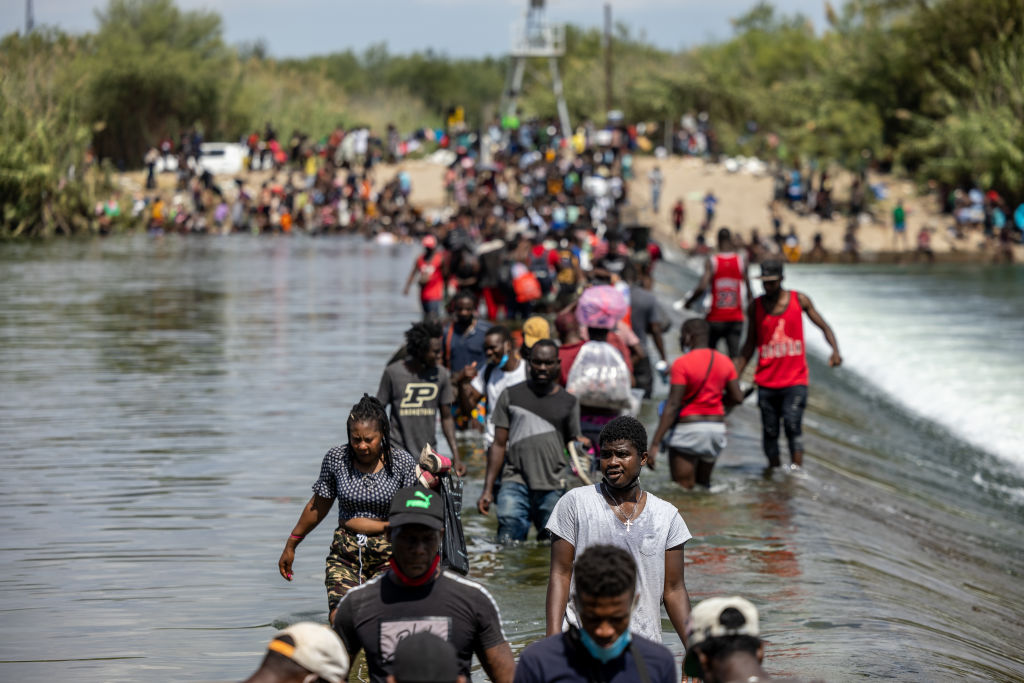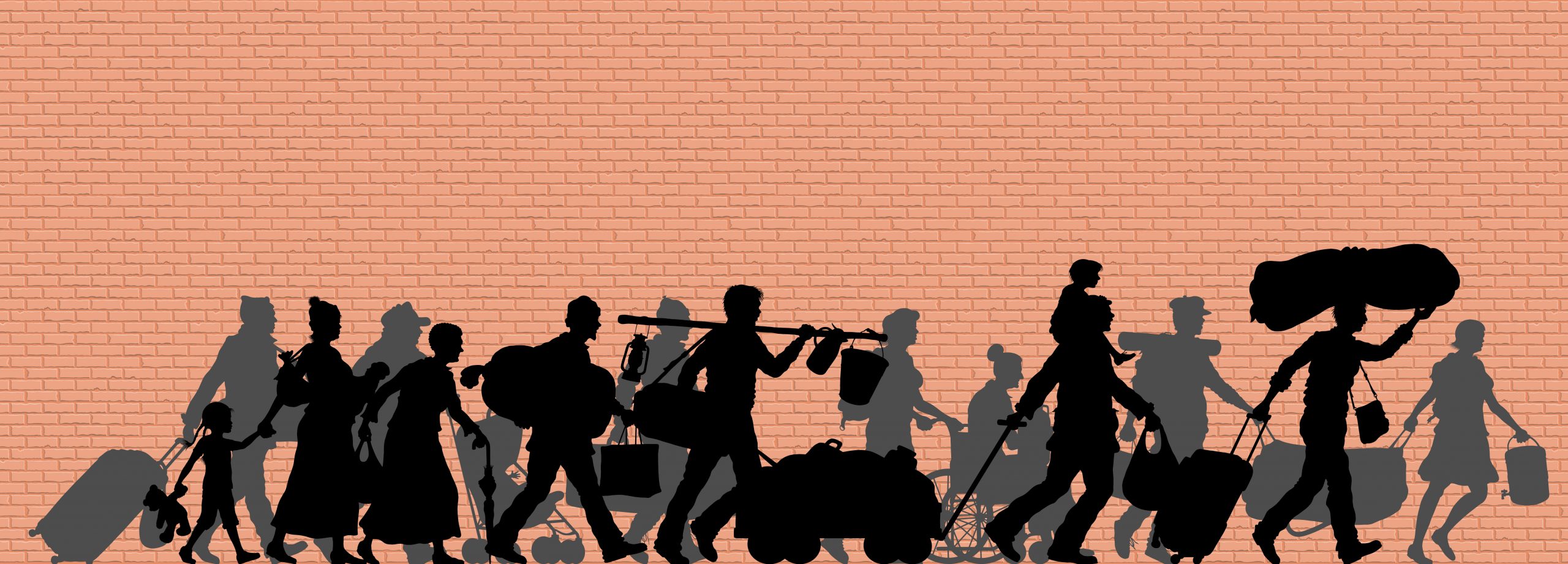Our ruling classes reject our right to govern ourselves.
Someone Orchestrated the Border Crisis

America increasingly resembles a failed state.
This piece originally appeared on the Texas Public Policy Foundation website.
You can see a long way from Border Patrol Hill. A clear day and good pair of binoculars get you visibility for 20, 30, sometimes 40 miles into Mexico, its view broken only by the rolling terrain on both sides of the Amistad reservoir. This used to be a barren and canyon-strewn section of the near despoblado: now it’s a “recreation area,” a dammed lake with recreation mostly on the north side. On the south side, it’s all business. The business is trafficking: drugs, people, lawlessness, the common coin of Mexico hellbound for Texas.
I stood on Border Patrol Hill at sunset, binoculars in hand, and surveyed the far shore. The low red sun was ideal for illuminating glass and metal at a distance: I could see the glints and flashes as the vehicles moved down from the approach roads onto the sandy shoreline. Nearly the whole apparatus of transport was visible from here, at this hour, when it was bright enough to see but dim enough that prudent drivers turned on their headlights. Carretera Federal 2, the cartel-controlled Mexican route hugging the border from Matamoros to just west of Ciudad Acuña, brought the main traffic—and then the vehicles bearing their cargo and people pulled off onto the tributary roads, descending momentarily out of sight before popping up again on the bluffs above the shoreline.
As the sun set, the traffic grew.
They came to the shoreline, and most of them parked, and waited. No families emerged to frolic in the reservoir waters—and would they here, after dark, or ever?—but groups of men did exit their vehicles. They stood, and they waited. On a handful of occasions, the men would be discharged, and the vehicle would leave. This was the exception: for the majority, it seemed as if there was something in the trucks, or vans, that was worth keeping near at hand.
On the near shore, I spotted an overturned hull: an abandoned boat from a past run.
Sweeping the view from east to west, I counted each Mexican-shoreline vehicle. I stopped at thirty. There were more. There were a lot. Assume two to three men per vehicle — which seemed about right based upon the numbers emerging from each—and there were perhaps a hundred, maybe more or less, on the opposite shore. Waiting. Waiting—and looking at me, silhouetted against the setting sun on the far shore, just as I looked at them.
Tonight would be a busy night for the men who bring drugs, people, and crime across the Texas-Mexico border. You could see it. You can see a long way from Border Patrol Hill. But one thing you can’t see is the Border Patrol.
The Border Patrol hasn’t been to Border Patrol Hill in over a year.
The Border Patrol is stretched thin these days. Everyone knows about the mass crossing of mostly Haitians—and their riverside encampment of uncounted thousands—in nearby Del Rio, Texas. That’s consumed Border Patrol resources and numbers to an extraordinary degree. I was alarmed to see that the usual inland checkpoints on US 377 (the north-south route into Del Rio) and US 90 (the east-west route into Del Rio) are completely shuttered. Whatever makes it past the border has, at the moment, free passage within the state.
The surge into Del Rio proper is immense. It isn’t just the Border Patrol. The inbound traffic of Texas State Troopers on US 90, traveling in convoys of a dozen or more vehicles, was more than I’d ever seen in my life—including during the BLM insurrection in Austin last summer. The Texas Army National Guard presence is similarly intense. Driving down a nice middle-class residential street in Del Rio, you pass by a stupendous number of military vehicles—mostly desert-scheme Humvees—parked in an orderly fashion, with their soldiers milling about. You’d never know it was a scene from a pleasant American neighborhood: there is something dystopic in the scenario. The Guardsmen are friendly, of course.
Everyone in the law-enforcement apparatus, military and not, state and federal and local, is unfailingly professional. I talk to an E-4 from Corpus Christi, Texas, and we discuss his dream of owning RV parks up and down the Gulf Coast. I note that he is burdened with the usual uniform and gear, including a dust mask for his neck and face, on a day when the humidity is well past 85 percent, and the temperature will eventually hit 102 degrees.
I also note that his M4 has a magazine in it.
The Haitian-migrant encampment beneath the international bridge from Del Rio to Ciudad Acuña is effectively sealed off now. As I write this, it is the morning of Tuesday, September 21, and the crisis is now several days old. In the early days—which is to say just last Wednesday, Thursday, and Friday—it was relatively easy to get to the encampment. That changed when the bureaucracy in Washington, D.C., grasped the magnitude of the bad press the influx of thousands generated. First they banned the use of flying drones to film the site. (Here’s a media protip for future incidents: FAA NOTAMs do not cover Mexican airspace, so fly your drones and film from there.) Then they squeezed out all but approved press likely to communicate the Administration narrative. Then they announced and implemented a phony policy solution to the whole thing: the Haitians will be flown to Haiti.
Some of the Haitians are, in fact, being flown to Haiti. We saw the Coast Guard C-130 that’s ferrying migrants from the Del Rio to Port-au-Prince, on the tarmac and readying to taxi. But only some: an unknown number of intact families among them are, we were told, being transported inland, released, and given notices to appear before an immigration judge sometime in the future. When will they have their day in court? Apparently the timeframe is within 12 to 36 months. Will they appear for that hearing? Will anything happen to them if they don’t appear?
We know the answers.
From D.C.’s perspective, then, the crisis is nearly over. The optics are under control: there are migrants visibly expelled from the country, there is a visible law-enforcement surge (albeit mostly Texan, not federal), and the media is effectively prohibited from direct access to the site. You’d think the last bit would be something media would protest, but no: excepting a few citizen journalists and right-of-center outlets who mean nothing to the federal apparatus, media acquiesces to the restrictions. They are the willing handmaidens of the elite narrative, not its skeptics—and certainly not its opponents.
Confronted with a truly historical event—it’s impossible to think of anything quite like fifteen thousand foreigners establishing an ersatz colony on American soil in the past century—the intent is to memory-hole it. There isn’t even a meaningful inquiry into why it all happened.
That doesn’t mean there are no answers. The answers exist. Todd Bensman of CIS did what virtually no member of the media has done—excepting one Los Angeles Times reporter I’m aware of—and crossed into Ciudad Acuña to talk to directly to the migrants on the Mexican side. What he found was surprising, and shocking. The Haitians reported that they, longtime residents of Mexico, were abruptly released by Mexican authorities to proceed north and cross into the United States in mid-September. The reason given: a gift in celebration of Mexican Independence Day. So they did—by the thousands.
Someone orchestrated this.
Who? To what end? These are questions a press corps competent to its putative purpose might pursue. These are questions to which a government genuinely concerned with the welfare and sovereignty of the United States might demand answers—and accountability. Neither media nor the federal government will do anything like that. We are left to ask it ourselves, and we start with the understanding that if Bensman’s account is accurate, then the Haitian incursion and encampment, stupendous and alarming as it is, is not the real crisis. Don’t misunderstand me: it’s a crisis in full, but it’s a crisis covering for something else.
It’s a feint.
A feint for what? Here we must speculate. At dusk I stand on Border Patrol Hill, where the Border Patrol has not set foot in a year, and I see the dozens of vehicles waiting to cross. They will cross, and they will succeed, because they are unopposed. Perhaps the Haitian influx is a feint to that end: a cartel operation leveraging the apparatus of Mexican governance that is increasingly in its thrall. Perhaps the Haitian influx is a feint for something else. Perhaps, on the other side of the border, there is a strategic mind at work—it would not have to be a particularly advanced strategic mind to perplex and outwit our federal leadership—and he is seeing what the Americans have to bring to bear. If that’s the case, then I’ll tell you one thing that mind has already learned: our leaders prioritize optics and symptoms over substance and causes.
The Haitians are pawns on the chessboard. They aren’t even close to the only migrants out here. Hardly a mile from the sealed-off international bridge, I make it to the riverbank, and there on a dusty roadside is a group of eight migrants. They’re right out of the river — bone dry, as it happens, because someone ferried them across. We have a wary exchange: I do not identify myself, and they can’t quite figure if I’m an authority figure or not. We speak, and their story emerges. They’re from Venezuela, and it took them six days to get here: flights from Venezuela to Colombia to Panama to Mexico; buses from Mexico City to Monterrey to Ciudad Acuña; and then the river crossing in broad daylight now. Mexico, they say, was quite dangerous. They paid a lot in bribes to Mexican authorities and police for their own safety. They know that won’t happen here. Now they’re waiting for their pickup. One man is bound for Dallas, where he has friends. The rest—a family group, they say—are headed for Portland, Oregon, where extended family will take them in. Eventually, as we talk, they get comfortable enough to allow me to take a group photo. Bienvenidos a los Estados Unidos.
I am disgusted by it, but not particularly at them. I give them a large bottle of water, as they are clearly hurting in the blazing heat. I am disgusted by the cascading failure of the D.C. system that does not do the one thing it ought, to stop this phenomenon cold: send illegal crossers back, immediately, by any available public authority. The migrants are rational actors. The traffickers are rational actors. The scattered pieces of the corrupt Mexican state are rational actors.
The only irrational actors in the system are us.
The family that owns Border Patrol Hill and the surrounding landscape has been present for generations. They’re the sort that built Texas, and they’re gracious in letting me see what they see — and what they live with. Days before, as the Haitians surged into Del Rio, the woman of the house encountered a single file of 20 Mexican nationals, all men, all with crew cuts, all in camouflage clothing, all with large backpacks, cutting across her property. She called for the Border Patrol and the sheriff, and mercifully both came. The men were caught—and thankfully did not resist. She was enraged. She’s had enough. As they loaded into the vehicles for transportation to detention—and probable eventual release—she yelled at them in perfect Spanish: when you go back, tell everyone you know, that if I find you here again, I will kill you.
Her ranch manager admonishes her: they’ll come back and burn you out. She respects him and knows he may be right. But she doesn’t care. Her family carved a life and a legacy out of these rocky hills athwart the Rio Grande. Her way of life is here. Her children are here. She is going to fight.
She will fight alone. The Border Patrol no longer comes to Border Patrol Hill. From this ranch … to the little house in upriver Comstock whose owner was told to move, because the Border Patrol could offer no protection … to uncounted homes and communities and territory all across the thousands of miles of border, there are places and people who are in and of the United States—and whom the United States no longer protects. Slowly, imperceptibly, federal authority surrenders sovereignty over a ranch here, a crossing there, a community there. Bit by bit, the interstitial network of ungoverned America expands until the day comes that we awaken to find that 15,000 foreign nationals have set up camp and a logistical network on the north bank of the Rio Grande.
It should be the moment that Washington, D.C., is shocked into action and changes its ways. It won’t be. Very well, the federal government won’t defend us or itself.
The American Mind presents a range of perspectives. Views are writers’ own and do not necessarily represent those of The Claremont Institute.
The American Mind is a publication of the Claremont Institute, a non-profit 501(c)(3) organization, dedicated to restoring the principles of the American Founding to their rightful, preeminent authority in our national life. Interested in supporting our work? Gifts to the Claremont Institute are tax-deductible.
Here’s how.
A reply to the hysterical arguments made by progressive liberals and others who should know better.



